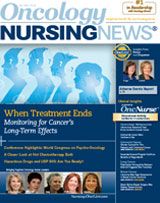Finding Our Way by Helping Patients Along Their Way
I am used to it now, the chuckles and candid references to compasses and aviation from some and the grateful looks from others, as though I have just extended them a lifeline.
Annie Lattanzio Hale RN, BSN, OCN

Annie Lattanzio Hale RN, BSN, OCN
I am used to it now, the chuckles and candid references to compasses and aviation from some and the grateful looks from others, as though I have just extended them a lifeline.
I am a nurse navigator. As the prevalence of patient navigation grows, particularly in the realm of oncology care, we often still struggle to define the role and illustrate its value. At times patients bring to the relationship their own notions of what their navigator will be to them, but more often they wait expectantly as I attempt to define it for them. My party line for what my role is as a navigator has evolved over the years and now cites my mission to coordinate, advocate, expedite, support, educate, and connect on behalf of the patient.
I started as an oncology nurse navigator following patients with gynecologic malignancies in February 2013. Despite having several years of experience as an inpatient oncology nurse, I was still struggling to find my sea legs in the brave new world of ambulatory oncology. Slightly unnerved that there was no clear endpoint to my day and no oncoming shift to watch over the flock by night, I found myself considering many aspects of my patients’ lives that would have previously been overshadowed by the din of acute care. Suddenly I was afforded the luxury of considering each human being—mind, body, and spirit—with the utmost care. Although this inspired me, it posed challenges as I strove to fully engage while still being mindful of boundaries: to care, but to preserve part of myself.
I carry within me the memory of Connie, one of the first patients I navigated. Connie was a 55- year-old mother of three young adult children of whom she was fiercely proud. She had originally been treated with surgery for early stage endometrial cancer. At the time of our meeting her endometrial cancer had recurred with a vengeance, riddling her liver with tumors and causing debilitating pain and nausea. Just after the first office visit I attended with Connie, during which her oncologist had discussed her remaining treatment options and she had chosen to try chemotherapy, she completed a written distress screening tool. On the form, she rated her distress level a 6-7 out of 10 and listed under other problems, “moving through cancer medically alone.” In the margin of the screening tool she scribbled, “Good news—today I met my very own nurse navigator (GYN) who came to my doctor’s office and introduced herself. She was awesome. Thank you LGH.” I was humbled upon reading this. I had not yet provided any real navigation for Connie, but she seemed comforted by the mere presence of a nurse navigator and the knowledge that someone was medically in her corner.
Over the next few weeks Connie struggled to tolerate her chemotherapy. She weathered significant fatigue and nausea remaining steadfast in her desire to live. Her older daughter was expecting a baby in 2 months, the first grandchild, and Connie brightened each time she spoke of baby June (who was due in May) and her development. At the same time, I scrambled to find my way as a nurse navigator by establishing the allies in expediting care that are critical to patient navigation and striving to find balance in this new role. Connie’s insurance plan was terminating, and her new plan had significantly higher out-of-pocket costs. As I sifted through options, I tried quickly to secure appointments for necessities, such as a mediport placement and blood work.
I was learning that the essence of navigation is being attuned to the needs of the whole patient and her family, as well as all of the hopes and fears, attitudes and temperaments they bring to the experience. I also became keenly aware that nursing care and navigation are only able to impact some of these needs; others would be beyond my control.
While Connie took her treatments with grace, and quietly labored to keep going, her husband Gordie battled to keep the family afloat. Gordie, self-employed and with two children in college, expressed feeling torn between the obligation to work and his need to be with Connie. He described himself as “a simple guy” and found the various prn medications prescribed for Connie’s symptoms overwhelming.
I came to expect a call most days from Gordie and talked him through the constipation, nausea, and poor appetite that plagued Connie. One morning they showed up at the oncologist’s office for an unexpected visit. Connie was restless and pacing. She could barely sit down and was unable to articulate her discomfort. Upon further discussion with Gordie, it came to light that Connie had developed akathisia after taking several doses of Compazine, a medication that was new for her. I could see the weariness in Gordie’s eyes for around every turn there was a new hurdle. Though I couldn’t change the reality of what this family was enduring, I became a consistent source of support for them in these hours of tumult.
I’ve navigated dozens of patients like Connie since then, although each story is unique. Still, Connie’s journey stays with me as it reminds me of the importance of being present. Even without the toolbox of connections and contacts or the intricate understanding of the twists and turns of the healthcare system which I later developed, being a reliable presence to which Connie and her family could turn was paramount. As nurse navigators we have a spectrum of capabilities and ways we can impact a patient’s life but often it is providing the steadying hand during the crisis that means the most.
Upon meeting Connie I knew that her time on earth was limited, but somehow I felt certain she would live to see her grandbaby arrive. That she did not left me saddened at the thought of a young woman negotiating new motherhood without her own mother; saddened at a grandmother unrealized. I suppose I imagined that Connie’s drive to meet baby June could overcome her failing body. In the end, we are left with what is and our feeble attempts to draw meaning and make sense of it.
During my last phone call with Gordie, a man to whom I had spoken almost daily, he recounted her peaceful death and her smile in the last hour of life as she sat among her family. Gordie expressed his gratitude to the medical team and said, “Connie would tell you to keep doing what you’re doing.” And I have.
Annie Lattanzio Hale RN, BSN, OCN, is an oncology nurse navigator at Lancaster General Health Ann B. Barshinger Cancer Institute, specializing in gynecologic and hematologic malignancies.

Innovative Program Reduces Nurse Turnover and Fosters Development
Published: September 12th 2024 | Updated: September 12th 2024The US Oncology Network (The Network) has developed one of the most comprehensive programs in the nation to support the professional development and retention of new oncology nurses.


